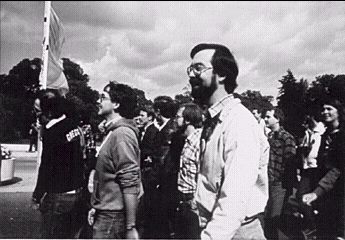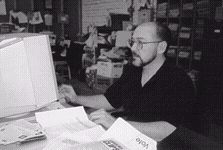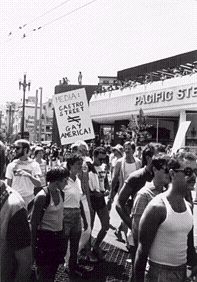 |


|
|
Interview by Steve Warren
Contributing Writer
 Editor's Note: On June 16, 1999, the Triangle's Spectator Magazine ran a cover story with the lengthy "Proud Papa: An interview with Jim Baxter, founder of The Front Page, which recently received the '99 Pride Award." Portions of the interview were edited (for reasons of space) and are included here. Other sections, of more interest to Spectator's readers are excluded. Of the hundreds of lesbian/gay publications in the U.S. alone, each has a specific mission � often tied to the publisher's political, financial or social agenda. Most also fill some need in their respective communities, or they don't survive. One paper whose constant high ratio of hard news to fluff I've long respected � grudgingly, as I provide some of its fluff � is The Front Page. It finds an amazing amount of news involving lesbian/gay issues in the Carolinas � amazing in the sense that anyone who lives in New York, San Francisco or Los Angeles will tell you nothing significant to our community, except the occasional March on Washington, ever happens outside of those cities. It was one of those Washington marches that gave Jim Baxter, then in his mid-twenties, the final impetus to found the paper late in 1979. It foundered at the end of the first year but bounced back and has published regularly � first monthly, then twice monthly, now biweekly � ever since, despite a few crises along the way. The same march led to my involvement with The Front Page, the longest, through far from the most lucrative continuing relationship in my efforts as a syndicated writer. Baxter had seen my work in the Philadelphia Gay News and invited me to contribute. A column comparing the 1979 march to others I'd been in was the first piece he accepted, and it took him the better part of a year to pay for it. How far back do we go? How far back can you remember?
I marched on Washington in '79 and '84, and came back energized and newly excited about the work. The 1993 march left me cold. I never felt more alienated or alone in my life than I did in that city full of gay men and lesbians. Maybe it's age. Maybe I was just in a bad mood. Who knows? I did see the same look of excitement I once had on the faces of young people marching for the first time, and that's probably just as it should be. For those reasons, I skipped Stonewall 25 entirely. I couldn't get excited about it. What did we prove � to ourselves or America � except that we really know how to throw a great party and drop major bucks? The movement I know does not manufacture "Official Souvenir Keepsakes," with little trademarks on them. It gives me the willies just to think about it. Still, if you're going to do that sort of thing, if you're going to be that crass and commercial, the least you can do is actually make money. And, as you know, Stonewall 25 didn't. For similar reasons, I don't care about the Millennium March. But I also think the people who are doing everything in their power to stop the Millennium March could spend their energy in more productive ways. La plus ca change. Looking through all your back issues, I wonder� Do you still get complaints about the classifieds? The internet � and especially, America Online � has taken much of that business away. The classified section has been with us since the paper began, and not just so I could have a place to run my own personal ad. One of the biggest problems we face as a group, then and now, is the isolation between us, the difficulty of making connections of every kind. One of the missions of The Front Page is to put an end to that isolation, and to my mind, the personals were and are just as much a part of that as anything else in the paper. I come from a different time and place, perhaps. I find racism offensive. I find sexism offensive. I don't find sex or sexual desire offensive. Tacky sometimes. And frequently funny. But not offensive.
I never felt it was the job of this newspaper to make it okay with your mommy for you to be queer. That's why I really didn't understand the reaction to the new gay glossy magazines when they first came out� 10 Percent, Genre, Out. I think those magazines are � or were, in some cases � great, I think they're breaking all kinds of old boundaries, and in their way, they're as much a part of the revolution as anything. But people's reactions were so strange� It was like "Look Ma it's okay now, we have magazines! See? We have pretty magazines just like yours� see? We keep them on our coffee table, next to Architectural Digest in our nice middle-class home. Now will you accept us? Please? Please? Please?" And I guess Mamma's supposed to say, "So he's a fag� he's got nice four-color magazines on the coffee table � just for him! Absolut Vodka wants his business! Benneton, too! Let's put him back in the will." Give me a break! I remember one of the new glossies got a letter that they published in an early issue, saying "Yours is the best gay magazine since After Dark!" If someone wrote that to me, I'd slit my throat! When I hear people say, "It's nice to have a publication we don't have to be ashamed of," I want to say, my dear, you don't have to be ashamed of anything� not The Front Page or the Advocate Classifieds or the fact that you're a homosexual. You just admitted you started The Front Page to get laid. Did you get laid? I admit nothing. I freely acknowledge that one of the reasons � one of the lesser reasons � for starting the paper was to have a place to run my own personal ad. When I ran a personal in The Advocate in the mid-70s, I got letters from everywhere in the country, plus letters from Japan, Mexico, Germany, Thailand and elsewhere. But I wanted answers from here.
If having a place to run your classified wasn't the reason, how did the paper start? Well, a lot of reasons, really. But mainly, the fellow who loaned me the money and I reasoned that if there was going to be change in North Carolina, it was going to have to be a statewide effort, and it was going to take a statewide gay and lesbian community. At the time, there was no statewide community, and if there was ever going to be a statewide community, it would need a means of communication, a regular, dependable forum. So that was mainly why The Front Page was created � to serve that community-to-be, and help create a regional sense of identity� Most gay newspapers are based in a large urban center. Atlanta. Chicago. Boston. Here in the Carolinas, no single urban area predominates, then or now. So, in order to have a sufficient advertising base, The Front Page had to be statewide. We needed to create a statewide market, as well. Of course, that "statewide community able to make a united effort for change" is still pretty much a dream. Those of us who were activists in the 70s and 80s were naive. We underestimated just how long it would take to put a statewide movement together. After all these years � and North Carolina's movement dates back to the mid-1970's � we're only now beginning to see it come together. We didn't take into account the very real demographic differences between the areas. Those differences don't have to keep us apart, but they do have to be recognized, understood and appreciated. You always hoped a lesbian and gay community would coalesce with the paper as its communications center. Did that ever happen, or did something else happen to compensate? I had to let that dream go. For a long time, I thought that I was keeping the paper alive so that, at some point, the people with the skills and the interest could come in and help make it happen. Well, what happened, of course, is that people with the skills and the interest went and started their own newspapers! What was an appropriate dream for the70s and 80s � appropriate in the sense that it kept me going � just wasn't an appropriate dream for the 90s. Now, it's important to look at this as a business, to try and make it profitable (which is still an incredible struggle). I didn't start the paper to make money. But I did learn that the paper needed money in order to do the work it was created do. I think its important to be self-sustaining because there are a limited amount of charitable dollars out there, and its important that those dollars go to political organizations, AIDS service organization, community centers, and dozens of other things. I think a community newspaper shouldn't be taking that money if it can help it. None of this is easy. But then someone meets you and says "When I was struggling to come out, The Front Page was the first thing I found" or writes you a note to say that "the paper is a lifeline for me out here in the boondocks" and, suddenly, you remember what you're doing the paper for, the real reason you ever got started in the first place. Of what are you most proud about The Front Page? Survival. I'm proud that it's survived. Issue after issue, month after month, year after year, the paper has been there. For twenty years. And I'm proud that, for the most part, its paid its own way. I've tried to make the paper the broadest possible medium I could. I want the paper to be mass communication that reaches the largest number of people possible. I think that, although the paper's not perfect, I succeeded in that respect. Again, I'm from another time, one where you judged a publication by the quality of the editorial content and not by the kind of advertising it was able to attract. Obviously times have changed in that regard. I hear from occasional critics that the Carolinas needed a more "respectable" publication� not, mind you, that it needed better journalism. And that sort of thing hurts, no question about it. But whoever said change was easy? or painless? Whoever said building a community was harmonious? Atlanta-based Steve Warren has written for more than 200 queer publications in the last 25 years. His current day job is managing the Reeltime website (reeltime.cln.com) for the Creative Loafing Network. |

© 1997-99 BEI
 Jim Baxter working
Jim Baxter working 